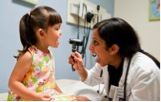

Bright Futures: Guidelines for Health Supervision of Infants, Toddlers, and Adolescents: Promoting Mental Health
Establishing mental health and emotional well-being is arguably the core task for the developing child and those who care for the child. Because cultures may differ in their conceptions of mental health, it is important for the health care professional to learn about the family members’ perceptions of a mentally healthy individual and their goals for raising their children. Link to Article
Early Childhood Adversity, Toxic Stress, and the Role of the Pediatrician: Translating Developmental Science Into Lifelong Health
Advances in a wide range of biological, behavioral, and social sciences are expanding our understanding of how early environmental influences (the ecology) and genetic predispositions (the biologic program) affect learning capacities, adaptive behaviors, lifelong physical and mental health, and adult productivity. A supporting technical report from the American Academy of Pediatrics (AAP) presents an integrated ecobiodevelopmental framework to assist in translating these dramatic advances in developmental science into improved health across the life span. Link to Article
The Science of Early Life Toxic Stress for Pediatric Practice and Advocacy
Young children who experience toxic stress are at high risk for a number of health outcomes in adulthood, including cardiovascular disease, cancers, asthma, and depression. The American Academy of Pediatrics has recently called on pediatricians, informed by research from molecular biology, genomics, immunology, and neuroscience, to become leaders in science-based strategies to build strong foundations for children’s life-long health. In this report, we provide an overview of the science of toxic stress. Link to Article
The Lifelong Effects of Early Childhood Adversity and Toxic Stress
Advances in fields of inquiry as diverse as neuroscience, molecular biology, genomics, developmental psychology, epidemiology, sociology, and economics are catalyzing an important paradigm shift in our understanding of health and disease across the lifespan. This converging, multidisciplinary science of human development has profound implications for our ability to enhance the life prospects of children and to strengthen the social and economic fabric of society. Link to Article
National Quality Measures for Child Mental Health Care: Background, Progress, and Next Steps
This article reviews recent health policies related to measuring child health care quality, the selection processes of national child health quality measures, the nationally recommended quality measures for child mental health care and their evidence strength, the progress made toward developing new measures, and early lessons learned from these national efforts. Link to Article
Behavioral and Emotional Problems Among Preschool Children in Pediatric Primary Care: Prevalence and Pediatricians' Recognition
This study examined how well private-practice pediatricians can identify emotional/behavioral problems among preschool children. Children aged 2 through 5 (N = 3876) were screened during a visit to 1 of 68 pediatricians who rendered an opinion about the presence of emotional/behavioral problems.
The Future of Pediatrics: Mental Health Competencies for Pediatric Primary Care
Pediatric primary care clinicians have unique opportunities and a growing sense of responsibility to prevent and address mental health and substance abuse problems in the medical home. In this report, the American Academy of Pediatrics proposes competencies requisite for providing mental health and substance abuse services in pediatric primary care settings and recommends steps toward achieving them. Link to Article
Promoting Optimal Development: Screening for Behavioral and Emotional Problems
By current estimates, at any given time, approximately 11% to 20% of children in the United States have a behavioral or emotional disorder, as defined in the Diagnostic and Statistical Manual of Mental Disorders, Fifth Edition. Between 37% and 39% of children will have a behavioral or emotional disorder diagnosed by 16 years of age, regardless of geographic location in the United States. Behavioral and emotional problems and concerns in children and adolescents are not being reliably identified or treated in the US health system. This clinical report focuses on the need to increase behavioral screening and offers potential changes in practice and the health system, as well as the research needed to accomplish this. Link to Article
To contact the webmaster, click here.